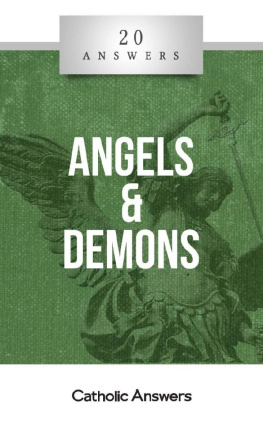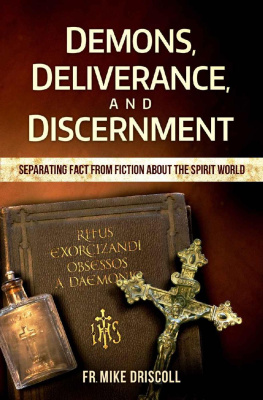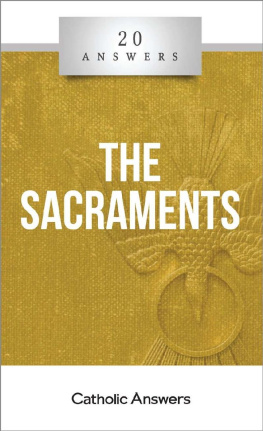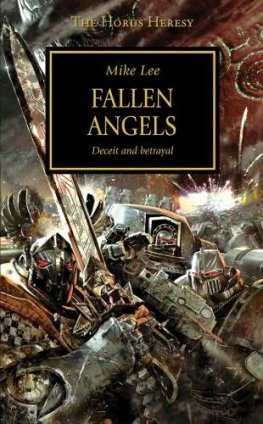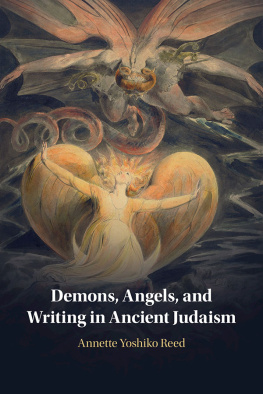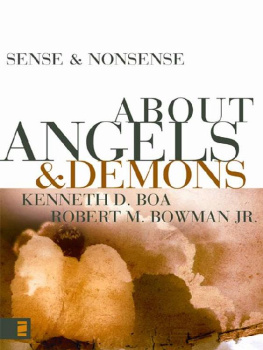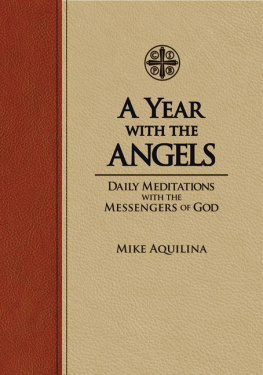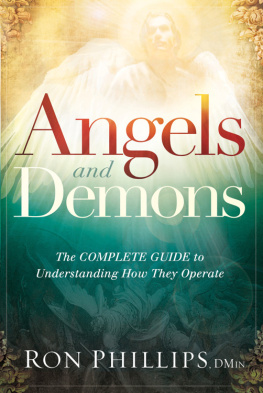Fr. Mike Driscoll - 20 Answers -Angels & Demons
Here you can read online Fr. Mike Driscoll - 20 Answers -Angels & Demons full text of the book (entire story) in english for free. Download pdf and epub, get meaning, cover and reviews about this ebook. year: 2016, publisher: Catholic Answers Press, genre: Religion. Description of the work, (preface) as well as reviews are available. Best literature library LitArk.com created for fans of good reading and offers a wide selection of genres:
Romance novel
Science fiction
Adventure
Detective
Science
History
Home and family
Prose
Art
Politics
Computer
Non-fiction
Religion
Business
Children
Humor
Choose a favorite category and find really read worthwhile books. Enjoy immersion in the world of imagination, feel the emotions of the characters or learn something new for yourself, make an fascinating discovery.
- Book:20 Answers -Angels & Demons
- Author:
- Publisher:Catholic Answers Press
- Genre:
- Year:2016
- Rating:5 / 5
- Favourites:Add to favourites
- Your mark:
- 100
- 1
- 2
- 3
- 4
- 5
20 Answers -Angels & Demons: summary, description and annotation
We offer to read an annotation, description, summary or preface (depends on what the author of the book "20 Answers -Angels & Demons" wrote himself). If you haven't found the necessary information about the book — write in the comments, we will try to find it.
20 Answers -Angels & Demons — read online for free the complete book (whole text) full work
Below is the text of the book, divided by pages. System saving the place of the last page read, allows you to conveniently read the book "20 Answers -Angels & Demons" online for free, without having to search again every time where you left off. Put a bookmark, and you can go to the page where you finished reading at any time.
Font size:
Interval:
Bookmark:
20 Answers
Angels & Demons
By Fr. Mike Driscoll

20 Answers: Angels & Demons
Fr. Mike Driscoll
2016 Catholic Answers
All rights reserved. Except for quotations, no part of this book may be reproduced or transmitted in any form or by any means, electronic or mechanical, including photocopying, recording, uploading to the Internet, or by any information storage and retrieval system, without written permission from the publisher.
Published by Catholic Answers, Inc.
2020 Gillespie Way
El Cajon, California 92020
1-888-291-8000 orders
619-387-0042 fax
catholic.com
Printed in the United States of America
ISBN 978-1-941663-89-9
ISBN 978-1-941663-90-5 Kindle
ISBN 978-1-941663-91-2 ePub
Table of Contents
1. What are angels?
Angels are purely spiritual beings created by God. Strictly speaking, the word angel (from the Greek for messenger) refers to their office, not their nature. In other words, the good spirits who interact with human beings are called angels, whereas those who operate strictly in heaven are more precisely called spirits. However, it is traditional and acceptable to call all of them angels. They are not eternal in the way that God is, that is, existing before and outside of time. Rather, they are eternal in the same way human souls are: once created, they exist forever. Because they do not have bodies, they do not experience the separation of body and soul which we call death.
God used his intellect in conceiving of the universe, and his free will in choosing to create it. Like human beings, angels are created in the image of God, which means they have intellect and free will; they are capable of thought and can choose courses of action. Unlike human beings still on earth, angels do not have to think about what God wants them to do; God enlightens them as to his will, or it may be the case that they consult the divine will as to what should be done ( Summa Theologica I:107:3). Since seeing the glory of God perpetually gives them happiness to the utmost capacity of their natures, it is impossible for angels not to desire and follow his will.
Being purely spiritual affects the intellectual capabilities of angels in several ways. They do not have emotions as human beings do, so their choices are not influenced by passions such as fear and anger; rather, they act based purely on their intellect. Because the angelic intellect is not physical, i.e., is not connected to a brain, angels do not reason step-by-step to a conclusion as human beings do; instead, they have concepts in mind all at once. For example, when choosing a course of action, angels do not spend time considering different possibilities; they can see all the possibilities at once and immediately make their decision.
Because their knowledge is not limited by physical senses, angels have the ability to know anything that is happening throughout the material world. Should they have the need, angels can intellectually apprehend the temperature at the North Pole, the flow of lava under the earths crust, or the rate of speed of a distant galaxy hurtling through space. Of course, angels would have no reason to focus their intellect on all such things as they occur, but instead apply their intellect to those things that pertain to Gods will for them.
Because angels are purely spiritual beings, they cannot be said to be in a particular place in the same way as a material object. One of Gods perfections is that he is present everywhere; in contrast, human beings have bodies, which determine our physical presence. Angels are different from both God and humans: they are not all-present as God is, but they are not connected to bodies as are human beings. Rather, the place where an angel exists at any moment is said to be where it is exerting its power. Angels cannot be in two places at once; in other words, they cannot exert their power in two different places at the same time. But the place where they exert their power need not be a small point; for example, it is just as easy for an angel to be present with a person to give an inspiring thought, as to protect a city, or to change the course of a planet. There are several places in the Bible where angels are described as having wings. Although they can manipulate air and solid matter to take any physical appearance they desire, they remain pure spirit, and so do not actually have wings by nature. The symbolism of wings represents their ability to move from one place to another almost instantaneously.
Time is also different for angels than it is for material beings. Humans comprehend the passage of time by physical means, such as the intellectual capacity of the brain, changes in the body, and the perceptions of the senses. Angels dont use such physical agency, so they do not experience time passing in the same way. The succession of events has meaning for them; in other words, an event succeeds some events and precedes others. But lengths of time do not mean anything to angels: they do not think it has been a long time since God created them, nor a short time. Whether keeping a star in motion for billions of years or speaking for a few minutes to a human being, angels do not tire, do not grow bored, and do not wonder how long until God wills them to do something else.
2. What is the angels relationship with God?
Whereas God continues to create new human beings, he created all the angels at the beginning of the world. They were all created good, for nothing that God creates is evil, but some rebelled against him, and rejected God and his reign ( The Catechism of the Catholic Church 392). This rebellion was irrevocable: the fallen angels, led by one called Lucifer, are completely evil and never will repent of their sin. Similarly, the angels who chose obedience to God made a permanent choice: none of them would ever decide later to rebel against him. The permanence of the angels choice is a result of their being pure spirits. We human beings often change our minds about things after gaining further knowledge and seeing the results of our decisions. There are times we make decisions based on heightened emotions and sensual desires, and laterwhen those influences have calmedwe may repent of a particular choice and make a better one. The angels are different: from the moment God created them, they had all the knowledge they needed to choose good or evil. Unlike us, they do not have senses and emotions that could affect their decisions. Whether an hour or a million years later, nothing in the angels thinking or experience is different, so the idea of changing their mind does not even make sense to them. Those who rebelled preferred unhappiness to obedience, and nothing they would learn laternot even an eternity of complete miserywould induce them to regret their choice.
What do angels do? Jesus said they constantly behold the face of our heavenly Father; as the Catechism states, The role of the angels is to glorify God without ceasing (CCC 350). According to St. Thomas Aquinas, the angels carry heaven with them; in other words, they are adoring God no matter where they are. The prophet Isaiah had a vision of angels crying to one another, Holy, holy, holy is the Lord of hosts; the whole earth is full of his glory (6:3). At the birth of Christ, after an angel announced the good news to the shepherds, there was a multitude of the heavenly host with the angel, praising God and saying, Glory to God in the highest, and on earth peace among men with whom he is pleased! (Luke 2:14). Similarly, the Apostle John had a vision of numerous angels in their worship of the Lamb, i.e., God the Son. And even though they may be in different places, according to St. Thomas, the angels do not go abroad in such a manner as to lose the delights of inward contemplation (ST I:112:3). In other words, since their adoration of God is an act of their intellect and will, angels are in continual worship no matter what other action they may be carrying out.
Next pageFont size:
Interval:
Bookmark:
Similar books «20 Answers -Angels & Demons»
Look at similar books to 20 Answers -Angels & Demons. We have selected literature similar in name and meaning in the hope of providing readers with more options to find new, interesting, not yet read works.
Discussion, reviews of the book 20 Answers -Angels & Demons and just readers' own opinions. Leave your comments, write what you think about the work, its meaning or the main characters. Specify what exactly you liked and what you didn't like, and why you think so.

